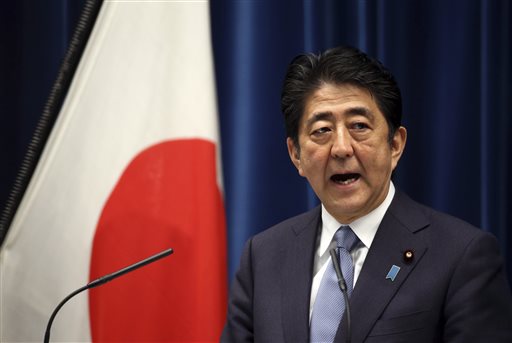Japanese leader Abe stops short of apology for World War II

Japanese Prime Minister Shinzo Abe delivers a statement to mark the 70th anniversary of the end of World War II during a press conference at his official residence in Tokyo on Aug. 14. Abe has expressed “profound grief” for all who perished in World War II in a statement marking the 70th anniversary of the country’s surrender. AP
TOKYO—Prime Minister Shinzo Abe acknowledged on Friday that Japan had inflicted “immeasurable damage and suffering” on innocent people in World War II, but stopped short of apologizing in a statement marking the 70th anniversary of the country’s surrender.
Instead he said that Japan’s repeated past “heartfelt apologies” would remain unshakeable in the future.
“On the 70th anniversary of the end of the war, I bow my head deeply before the souls of all those who perished both at home and abroad,” Abe said in a 25-minute address delivered live on national television. “I express my feelings of profound grief and my eternal, sincere condolences.”
The statement was closely watched by Japan’s neighbors, especially South Korea and China, and it was unclear whether it would satisfy them.
Resentment over invasion, occupation and atrocities by the Japanese Imperial Army before and during the war still bedevils relations between Japan and the East Asian countries seven decades after Tokyo’s surrender on Aug. 15, 1945.
Article continues after this advertisementAbe noted that more than 80 percent of the country’s population was born after the war, and echoed growing though not universal sentiment in Japan that the country has apologized enough.
Article continues after this advertisement“We must not let our children, grandchildren and even further generations to come, who have nothing to do with that war, be predestined to apologize,” he said.
But he said Japan took the wrong course in going to war and that, across generations, Japanese must squarely face their country’s past.
“We have engraved in our hearts the histories of suffering of the people in Asia as our neighbors: Those in Southeast Asian countries such as Indonesia and the Philippines, and Taiwan, the Republic of Korea and China, among others,” he said.
While pledging that Japan would remain peaceful, he used the speech to make veiled criticism of China’s activities in disputed waters in the region.
China has been reclaiming land and erecting structures on South China Sea atolls that are claimed by the Philippines and other countries. In the East China Sea, Japan objects to Chinese aerial and marine patrols around islands that both countries claim.
Noting Japan’s constitutional pledge not to resort to force to settle international disputes, Abe said that any disputes must be settled diplomatically based on the rule of law.
He also made an apparent reference to foreign wartime prostitutes for the Japanese army, though he avoided the question of whether the so-called “comfort women” were forced into the work, a hotly disputed issue with South Korea.
“We must never forget that there were women behind the battlefields whose honor and dignity were severely injured,” he said.
Abe said that Japan must never again repeat the devastation of war, saying the countless lives of young people lost in countries that fought Japan leaves him speechless and rent with grief.
“History is harsh,” he said. “What is done cannot be undone.”